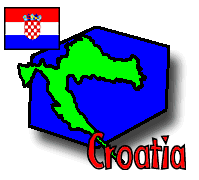
Official Name: Republic of Croatia (Republika Hrvatska)
Location: Croatia is located on the Balkan Peninsula of Southeastern Europe (about the 45th parallel, North). It is one of the republics that gained independence from Yugoslavia in the early 90s. It is bordered on the west by the Adriatic Sea. It touches Slovenia and Hungary to the north, Bosnia and Yugoslavia (Serbia) to the east, and Bosnia and Yugoslavia (Montenegro) to the south.
Land Area: 56,410 sq km (21,774 sq mi).
Coast: 5,790 km (3,596 mi) of coastline on the Adriatic Sea, the majority of which is on islands that dot the coastline.
Climate: Croatia has a mixed Mediterranean and continental climate, with mild winters and dry summers along the coast and wider temperature fluctuations in the interior.
Population: Over 4.2 million inhabitants, of which 18% are younger than 15, and 67% are between 15 and 64 years old.
Language: Most Croatians speak Croatian, but German is also widely spoken as a second language. Italian, English, Hungarian, and Czech and Slovak are also spoken in some areas.
Religion: The Croat population, who are the majority in Croatia, is primarily Roman Catholic, while the Serb population in Croatia is primarily Eastern Orthodox. There are minority Muslim, Protestant and other religious communities.
Government: Croatia is presidential/parliamentary democracy. The Executive Branch consists of a popularly elected president, a prime minister, and a council of ministers. The Legislative Branch consists of the parliament, the Sabor, a 152-member House of Representatives (Zastupnicki Dom) (the 68-member House of Counties [Zupanijski Dom] was abolished in 2001). The Judicial Branch consists of the Constitutional and Supreme Courts. The prime minister is appointed by the president, and the ministers are appointed by the prime minister. Judges are appointed by the Judicial Council of the Republic, which is elected by the House of Representatives.
Executive (President or King): President Stjepan (Stipe) Mesic
Capital: Zagreb
Flag: ![]()
Currency: The Croatian currency is the Croatian kuna (HRK), which is divided into 100 lipas. The exchange rate was approximately 6.3 Croatian kuna (HRK) for every $1 while BikeAbout was in Croatia.
![]()
![]() Find out how many Craotian kuna there are in your local currency!
Find out how many Craotian kuna there are in your local currency!
Resources and Industry: The Croatian economy relies on industrial activity, mining and manufacturing, including ship-building (Croatia is one of the world's largest producers of ships). War in the 1990s dramatically impacted the tourism industry, which was at one time a major contributor to Croatia's economy.
Transport: 27,840 km (17,289 mi) of road; 2,296 km (1,426 mi) of train tracks.
Electric current: 220 volts.
Time Zone: GMT +1 hour
Sources: CIA World Factbook 2000, Mediterranean Europe on a shoestring (Lonely Planet), Lonely Planet
Note: The opinions expressed in these sites do not necessarily reflect the opinions of BikeAbout. If you have seen a Web site that you think BikeAbout participants would be interested in, please send the URL to links@bikeabout.org. We'll review the site and consider adding it to our resource library.
 |
 |
 |
 |
 |
|
Itinerary/ Journal |
Discussions |
Resource Library |
eDscape Projects |
Scrapbook |
|
|
|
|
|
|
Copyright 1997-2004 BikeAbout. All rights reserved.